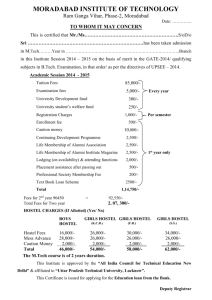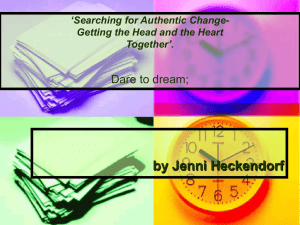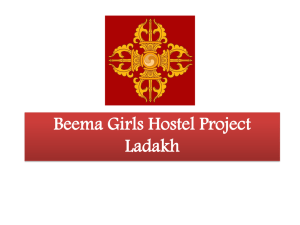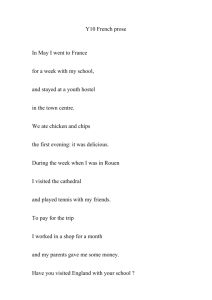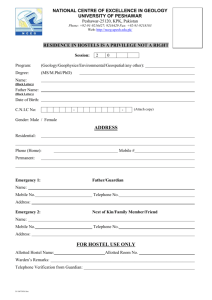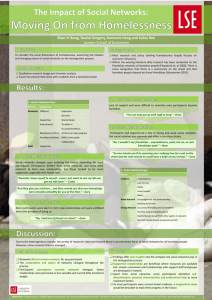11 November 2014 Dear Parent/Carer ’s school. We
advertisement
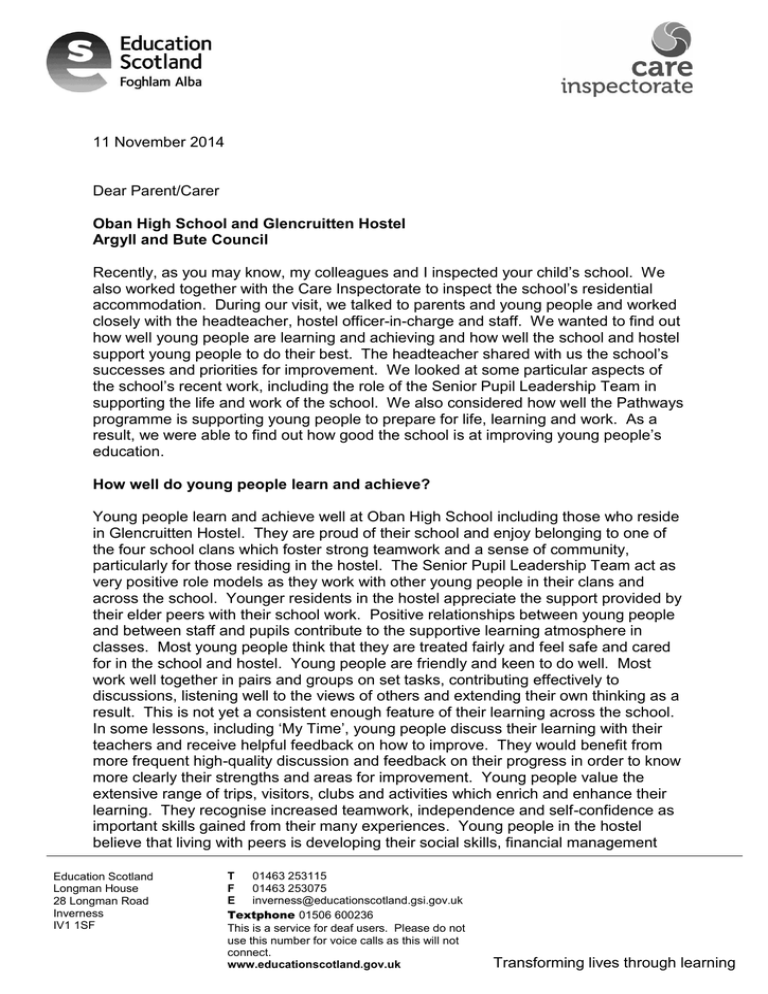
11 November 2014 Dear Parent/Carer Oban High School and Glencruitten Hostel Argyll and Bute Council Recently, as you may know, my colleagues and I inspected your child’s school. We also worked together with the Care Inspectorate to inspect the school’s residential accommodation. During our visit, we talked to parents and young people and worked closely with the headteacher, hostel officer-in-charge and staff. We wanted to find out how well young people are learning and achieving and how well the school and hostel support young people to do their best. The headteacher shared with us the school’s successes and priorities for improvement. We looked at some particular aspects of the school’s recent work, including the role of the Senior Pupil Leadership Team in supporting the life and work of the school. We also considered how well the Pathways programme is supporting young people to prepare for life, learning and work. As a result, we were able to find out how good the school is at improving young people’s education. How well do young people learn and achieve? Young people learn and achieve well at Oban High School including those who reside in Glencruitten Hostel. They are proud of their school and enjoy belonging to one of the four school clans which foster strong teamwork and a sense of community, particularly for those residing in the hostel. The Senior Pupil Leadership Team act as very positive role models as they work with other young people in their clans and across the school. Younger residents in the hostel appreciate the support provided by their elder peers with their school work. Positive relationships between young people and between staff and pupils contribute to the supportive learning atmosphere in classes. Most young people think that they are treated fairly and feel safe and cared for in the school and hostel. Young people are friendly and keen to do well. Most work well together in pairs and groups on set tasks, contributing effectively to discussions, listening well to the views of others and extending their own thinking as a result. This is not yet a consistent enough feature of their learning across the school. In some lessons, including ‘My Time’, young people discuss their learning with their teachers and receive helpful feedback on how to improve. They would benefit from more frequent high-quality discussion and feedback on their progress in order to know more clearly their strengths and areas for improvement. Young people value the extensive range of trips, visitors, clubs and activities which enrich and enhance their learning. They recognise increased teamwork, independence and self-confidence as important skills gained from their many experiences. Young people in the hostel believe that living with peers is developing their social skills, financial management Education Scotland Longman House 28 Longman Road Inverness IV1 1SF T 01463 253115 F 01463 253075 E inverness@educationscotland.gsi.gov.uk Textphone 01506 600236 This is a service for deaf users. Please do not use this number for voice calls as this will not connect. www.educationscotland.gov.uk Transforming lives through learning skills and is preparing them well for living independently when they move on from school. Those in the support department are particularly enthusiastic about out-of-class learning experiences which involve important life skills, including swimming trips to the local leisure centre. In the hostel, young people feel their views are valued and taken into account. Within the school young people feel that their views are listened to. However, they do not think that they have a sufficient say in decision-making, particularly in relation to how they learn in their lessons. In S1, young people are building well on their prior learning in literacy and numeracy as a result of improved transition arrangements with the associated primary schools. The school does not yet have a clear enough overview of young people’s progress from S1 to S3 across all curriculum areas. This includes those young people requiring additional support with their learning. From S4 to S6 the attainment of those leaving school is similar to that of other young people with similar needs and backgrounds across Scotland. The school is aware of the need to improve young people’s attainment in numeracy. Young people are attaining well within performing arts and physical education. Those in the support department achieve an appropriate range of qualifications from National 2 to National 5. At S5/S6, the success of those studying for qualifications delivered through partnership arrangements with Argyll College is not high enough. Across the school young people are well informed about how to lead a healthy lifestyle and keep themselves safe. Almost all young people are successful in moving on to employment, training or further learning on leaving school. A notable number of young people engage enthusiastically and achieve success by participating in an extensive range of sporting, cultural, musical, volunteering and leadership activities and events. Through their involvement in these activities they gain a wide range of important life skills, such as resilience and self-belief, and are developing well as young citizens. Their achievements are celebrated well through clan assemblies, the clan points system, annual awards ceremony, school website and local media. Staff could extend the use of accredited award schemes to recognise and celebrate young people’s achievements, including those achieved by young people in the hostel. Young people respond positively to the high expectations set by the Schools of Rugby, Traditional Music and Dance showing mature attitudes in their participation and in their roles as coaches and mentors to their younger peers. As a result, young people are achieving success at the highest level in these specialist areas, including the highly successful school pipe band and rugby teams. The school needs to build on these successes to support all young people to have planned opportunities for personal achievement and to recognise the skills gained from their participation. How well does the school support young people to develop and learn? Overall, the school supports young people to learn well. Some aspects of the curriculum need further improvement. In lessons, most tasks and activities are appropriate to meet the needs of learners. Teachers are aware of the range of different needs in their classes. However they do not consistently take account of these differences in the ways they plan and deliver lessons. In some lessons, there is a brisk pace with a level of challenge which ensures all young people make the best progress. This practice needs to be adopted by all teachers across the school. Staff meet the care and welfare needs of young people very well. Support for learning staff 2 effectively assess young people for a range of support needs and liaise successfully with a range of external agencies and services. A skilled team of specialist support staff provide well-planned targeted support to young people. Those in the support department provide effective support for all young people in their care. The school needs to introduce individualised plans with both short and long term targets to ensure young people who require additional support with their learning make suitable progress. The school-based youth workers compliment the work of guidance staff well, through the provision of tailored support for a few young people with additional support needs. The school has very good arrangements for supporting children as they move from primary to secondary, including those transferring to the hostel. Within the hostel, staff provide a caring and supportive environment for young people. Improved partnership arrangements between school and hostel staff will support young people better with their studies. Staff continue to develop the curriculum to reflect the principles and purposes of Curriculum for Excellence. The curriculum aims to provide young people with opportunities and experiences to help them achieve, including gaining the best possible qualifications. A clearer rationale and plan for the curriculum within the support department needs to be developed. Within the hostel, young people experience a range of planned activities to develop their interests and talents. At S1 to S3, the curriculum is designed to provide a broad general education based on Curriculum for Excellence guidance. Commendably, all young people in S1 have opportunities to learn Gaelic. From S1, young people make choices to personalise their learning as they progress through S2 and S3. This curriculum structure does not sufficiently ensure that young people build continuously on their prior learning and experience the level of challenge to prepare them well for progression into S4. From S4 to S6, the school offers a wide range of courses and programmes providing flexible pathways to meet the needs of individuals and groups. A wide range of partnerships, including Argyll College, Open University and local employers extends the opportunities available to young people. At S6, the Pathways programme enables young people to gain relevant skills and work-based experience in a profession or industry that they may wish to pursue on leaving school. Staff should develop further their arrangements for linking learning across different subject areas. They should continue to improve progression in learning through better curriculum links with primary schools and the hostel. There also needs to be a stronger focus on meeting young people’s entitlement to Gaelic Medium Education at all stages. Those learning through the medium of Gaelic benefit from a few activities, such as debating, in which to develop further their fluency. How well does the school improve the quality of its work? The headteacher has successfully prioritised creating a positive learning environment and sense of community as central to improving the overall quality of the school’s work. The depute headteachers support the headteacher well within their respective remits. As a team, they have made a positive start to directing the school’s approaches to improvement planning and self-evaluation activities. These include observing learning and teaching, sampling pupils’ work and the review of performance in national examinations. Principal teachers have led curriculum developments well within their faculties, including the development of programmes of learning to support the delivery of the new National Qualifications. Teachers have taken ownership of 3 their professional learning and development through visits to other schools and gaining the necessary qualifications to teach additional subjects. However, the school’s approaches to self-evaluation and planning for improvement are not consistent enough or having enough impact on the quality of young people’s experiences. Senior and, in particular, middle managers need to be more consistent and take greater responsibility for monitoring self-evaluation activities, including within the support department, to increase the pace of improvement. Within the hostel, staff need to develop an improvement plan setting out clear and agreed priorities. Young people, parents and partners could also be more effectively involved in evaluating and improving the work of the school and hostel. During the previous Care Inspectorate inspection, the hostel had one requirement and two recommendations. From these, the requirement and one of the recommendations have been met. Outstanding issues relating to young people’s personal support plans are carried forward in this inspection. As a result of this inspection, there is one new requirement and three new recommendations. Further details about these can be found at the link on page five of this letter. This inspection found the following key strengths. Well-behaved, motivated young people who are keen to do well. The school’s positive climate and the ways young people interact with one another and with staff. Young people’s achievements in the performing arts and sports supported by the Schools of Rugby, Traditional Music and Dance. The role of the clan system in promoting inclusion, equality and achievement. We discussed with staff and Argyll and Bute Council how they might continue to improve the school. This is what we agreed with them. Continue to review and develop the curriculum to better meet the learning needs and improve the attainment of all young people, including through the medium of Gaelic. Strengthen arrangements for self-evaluation to improve young people’s learning experiences and attainment further. What happens at the end of the inspection? We are satisfied with the overall quality of provision. We are confident that self-evaluation processes in the school and hostel are leading to improvements. As a result, we will make no further visits in connection with this inspection. As part of its arrangements for reporting to parents on the quality of education, Argyll and Bute Council will inform parents about the school’s progress. Fiona Robertson HM Inspector 4 Additional inspection evidence, such as details of the quality indicator evaluations and national care standards gradings, for your school and hostel can be found on the Education Scotland website at http://www.educationscotland.gov.uk/inspectionandreview/reports/school/primsec/Oba nHighSchoolArgyllandBute.asp If you would like to receive this letter in a different format, for example, in a translation please contact the administration team on the above telephone number. If you want to give us feedback or make a complaint about our work, please contact us by telephone on 0141 282 5000, or e-mail: complaints@educationscotland.gsi.gov.uk or write to us addressing your letter to the Complaints Manager, Denholm House, Almondvale Business Park, Livingston EH54 6GA. 5
